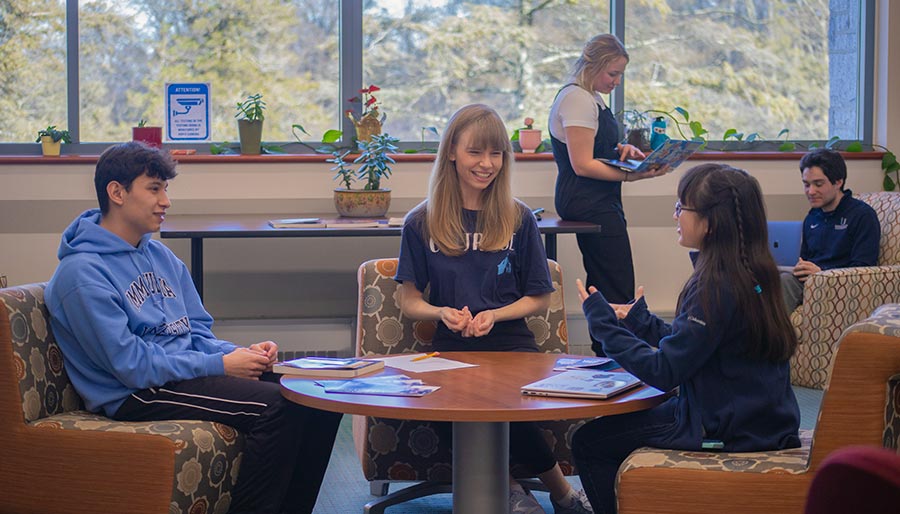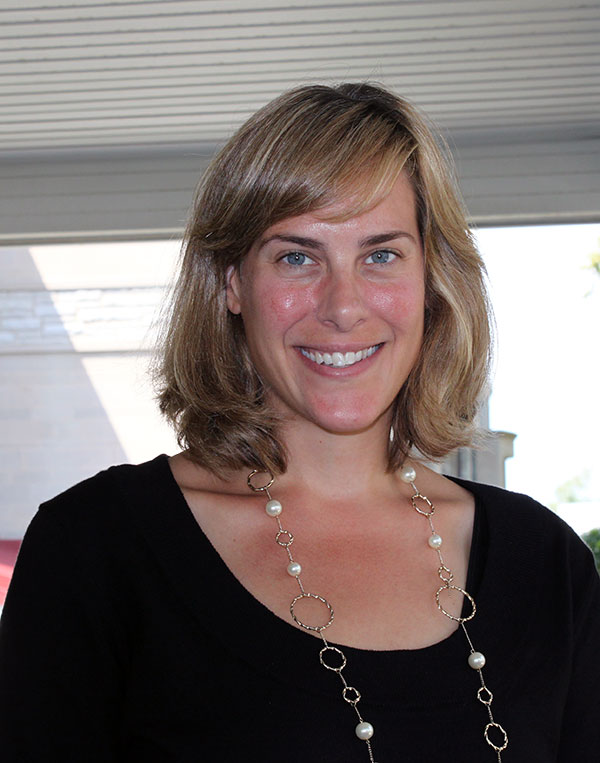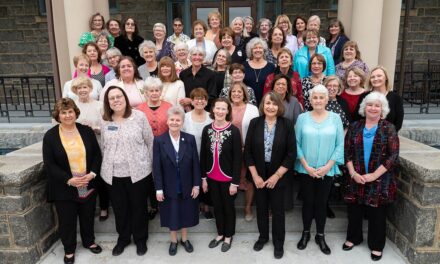Immaculata students have a small army of people—and even pets—to support them academically and emotionally. Undergraduate, graduate and adult students can all take advantage of free learning support and wellness services, from test-taking accommodations to counseling appointments and pet therapy events.
While these services have long been available at Immaculata, the University has enhanced its efforts in recent years to respond to growing interest from students and expanding cultural awareness of everyone’s need for social support and mental well-being. The stigma associated with simply asking for help seems to be decreasing.
For some students, “it’s become really almost stylish to have a counselor!” says Jessica Gilpert, director of counseling services. In her 11 years at Immaculata, she has seen a rise in students’ interest in self-care and mental health and in their openness in discussing these topics. She emphasizes that counseling is for anyone who wants to manage stress, notice their strengths, improve their relationships, process their emotions or adapt to change. “I think it’s really great that people are talking about that more and making it more of a normal thing to get support,” said Gilpert. “I think we all need somebody by our side sometimes to help get us through.”
As Immaculata’s enrollment grows, so does the need for student support services. To support students holistically, “it does take a village,” said Jennifer Peruso, executive director of learning support services. Her office works with faculty and counseling and advising staff to help students succeed. She and her team focus on creating relationships with students so they feel safe and comfortable asking for support.
Peruso and her team offer students specialized support with writing and math skills, subject area tutoring and learning tips and strategies. The team also encourages students and helps them develop independence as learners. For students with documented disabilities, Peruso arranges accommodations, which may include extended time on tests, materials and textbooks in alternate formats such as enlarged print or Braille, or environments with additional privacy and reduced distractions for testing or working on assignments.

The University’s high student satisfaction and retention rates indicate the effectiveness of its learning support and counseling services. Students know that professors and staff are available to help them not only with earning their degrees and preparing for their careers, but also with managing the stressors of college life and growing into their strengths.
To help them transition to college, build self-awareness and develop coping skills, Immaculata’s traditional undergraduates start their college careers with a wellness-focused first-year seminar course in which they rate their strengths, identify areas where they may need help and describe their receptivity to Immaculata’s services. Faculty and staff then tailor their outreach to students’ needs, offering support in the areas requested.
Further supporting first-year students, Gilpert and her counseling services staff visit each first-year seminar class to discuss coping skills and stress management and to help students develop plans for self-care, which could include mindfulness practices, emotional awareness and reflection without judgment, relaxed breathing and calming or fun activities, such as making art, talking with friends, laughing or listening to music.
Gilpert also makes students aware of the counseling services, wellness activities and educational programming her office provides in collaboration with Elise Girard, Immaculata’s director of health services. Girard and Gilpert organize popular pet therapy sessions each month with Pals for Life, a local organization whose volunteers bring dogs and other animals to campus for students to meet so they can decrease stress and improve their moods. Additionally, Immaculata’s counseling and health services team organizes other events including wellness fairs, stressbuster activities during finals week and opportunities for reflection through arts and craft projects.

What’s more, students can visit the art space and relaxation room in the Bruder Center, where Immaculata’s counseling offices are located. Students can drop in any time during business hours to sit in a massage chair, enjoy aromatherapy from essential oils, practice guided meditations, use a sun lamp for light therapy or write in an advice booklet to share with other students.
With help from these self-care resources and academic and mental health services, students are embracing their need for support and making remarkable progress. In individual counseling sessions, Gilpert helps students gain insight into who they are, find freedom from restrictive social expectations, feel good about being their authentic selves, develop resilience, discover that they’re stronger than they thought and get excited about how they’ve grown. “That’s one of my favorite parts about doing this work—helping people see the strengths that they have innately inside of them,” she said. “There are some really amazing students on this campus.”
“We see such improvement among students who come to work with us,” said Peruso, mentioning students’ increased confidence in their academic abilities as well as better social skills. Students often tell Peruso that they passed exams and brought their grades up, and she and her team celebrate those achievements. “The students are our priority,” Peruso said, “and we wouldn’t do this if we didn’t really love helping them.”






